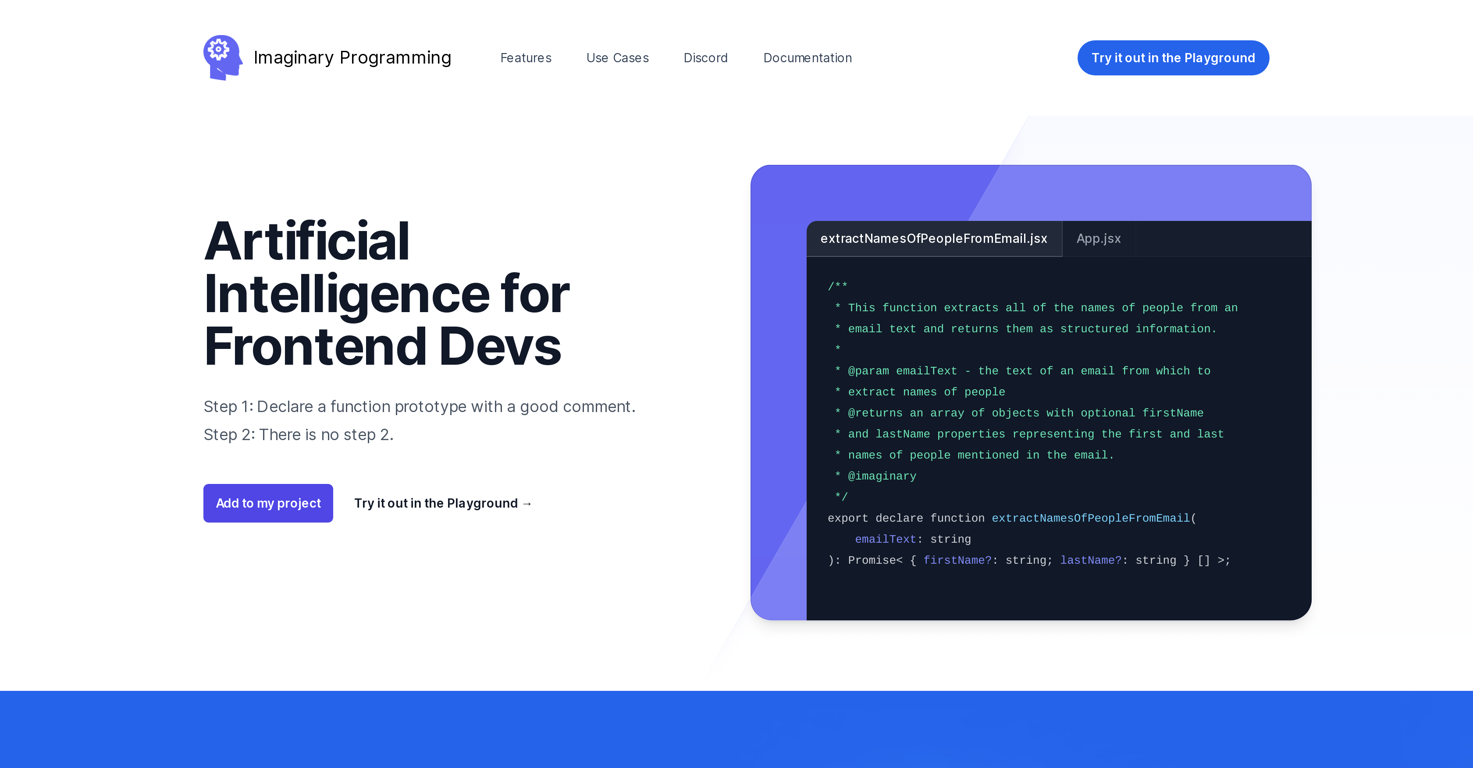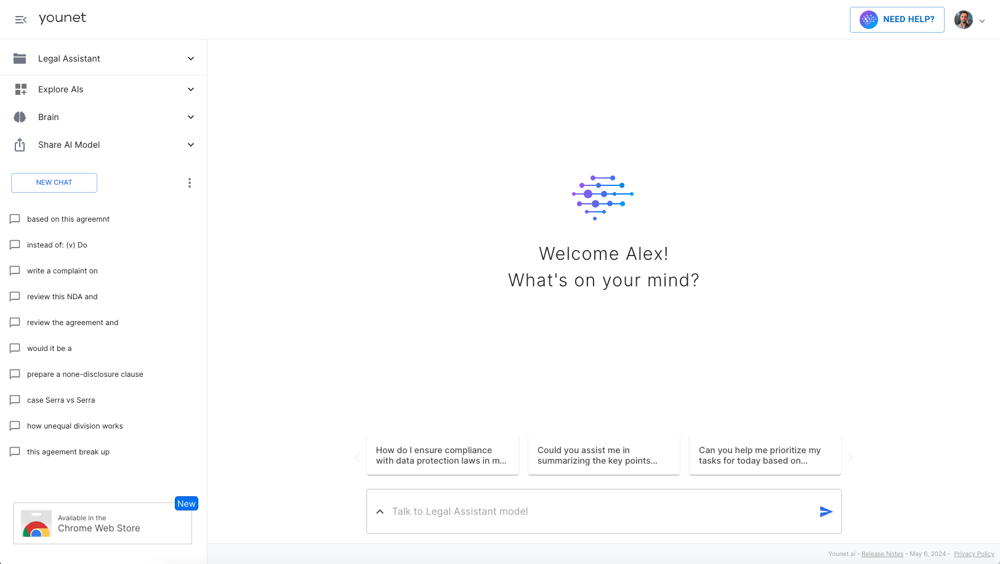What is Imaginary Programming?
Imaginary Programming is an AI tool that uses OpenAI's GPT engine as a runtime, allowing developers to work on new problems without obligatory dependency on a Machine Learning team. It allows developers to define function prototypes in TypeScript, enabling GPT to take care of the rest. This tool can be used for any task that requires human-like understanding around text, making it extremely versatile.
What features does Imaginary Programming provide?
Imaginary Programming provides tools for generating useful text for users, classifying data with human-like intelligence, and extracting structured data from messy, non-structured language. It provides an online Playground for experimenting with its features without having to incorporate it into projects precisely. Through Imaginary Programming, developers can also create 'Imaginary Functions' by specifying what to do through comments. And all of the data extracted or classified can be exported in the familiar JSON format.
What languages is Imaginary Programming compatible with?
Imaginary Programming is compatible with TypeScript, a popular language that's appreciated for its static types. As the tool is TypeScript-based, this makes it easy to integrate with existing Node.js, Next.js, and React projects.
How does Imaginary Programming utilize the GPT engine?
Imaginary Programming uses the GPT engine as a runtime. Developers can outline a function prototype accompanied with a valuable comment, and Imaginary Programming makes use of GPT to convert these comments into functional code, effectively streamlining code generation.
What can developers achieve with Imaginary Programming?
With Imaginary Programming, developers can create solutions for tasks that require human-like text understanding. They can generate useful titles, classify data, and extract structured information from unstructured language. It also allows them to define a function with a comment and lets the tool handle the rest, thus adding a level of intelligence to their code. In addition, it's also possible to explore these functionalities in a Playground without installing them into existing projects.
How can I use Imaginary Programming with Node.js, Next.js, and React projects?
Imaginary Programming is a perfect tool for Node.js, Next.js, and React projects due to its TypeScript-based nature. By defining function prototypes in TypeScript and coupling them with meaningful comments, developers can imbue their existing projects with AI-powered capabilities.
What types of problems can Imaginary Programming help me solve?
Imaginary Programming can assist developers in solving problems that require human-like intelligence in text-based tasks, whether it's generating meaningful text for users, classifying data, or extracting structured information from unstructured language. Its capabilities can facilitate entirely new solutions and approaches previously unachievable with traditional coding methods.
How to define a function prototype in Imaginary Programming?
In Imaginary Programming, developers start by declaring a function prototype with a precise comment. This can be done in TypeScript and doesn't need an implementation of the function. Imaginary Programming uses the OpenAI's GPT engine to interpret the comment and generate the required code.
What is the purpose of the Playground in Imaginary Programming?
The Playground in Imaginary Programming serves as an interactive space for developers to test and experiment with the tool's capabilities without needing to install it into their existing projects. It allows for an immediate hands-on experience and learning of the platform before integrating it into larger-scale development work.
Does Imaginary Programming require prior experience with ML?
No, Imaginary Programming does not require any prior experience with Machine Learning. Instead of spending time on training an AI model, developers can simply give instructions to an 'Imaginary Function' via comments to achieve their desired outputs.
How can Imaginary Programming be used to classify data?
Imaginary Programming can classify data using human-like intelligence. Developers can use it to classify if the text has a particular semantic intent or emotion. For example, it can help to gauge the emotional tone of a customer's email.
Can Imaginary Programming extract structured data from unstructured language?
Yes, Imaginary Programming can parse and extract structured data from unstructured or otherwise messy language. Developers can tell an 'Imaginary Function' what kind of data they're looking for, and the function will find the structure inside the mess, presenting it in a structured JSON format.
How can Imaginary Programming generate text for users?
Generating text for users is one of the features Imaginary Programming provides. Developers can use it for any task that requires a meaningful title, summary, or any form of text for users. For instance, they can use it to come up with a fitting name for a user's playlist.
Is Imaginary Programming similar to Github co-pilot?
No, Imaginary Programming is not quite the same as Github co-pilot. While Github co-pilot helps developers to solve recurring problems faster, Imaginary Programming aims to enable tackling of entirely novel problems, pushing the boundaries of what can be accomplished with AI in coding.
How can Imaginary Programming incrementally add intelligence to my project?
Imaginary Programming offers a way to incrementally infuse AI into existing projects. Developers can progressively define function prototypes in TypeScript coupled with elaborate comments. Imaginary Programming then uses the GPT engine to convert the carefully crafted comments into functional code, adding an element of intelligence to the projects over time.
What's the advantage of Imaginary Programming output in JSON format?
The advantage of Imaginary Programming outputting in JSON format is the familiarity and ease of use it provides for developers. As a prevalent format for data exchange, JSON's lightweight nature and readability make it a preferred choice, ensuring the output data from Imaginary Programming can be easily shared and manipulated.
How can Imaginary Programming be used without an ML team?
Imaginary Programming provides the means for developers, even without a dedicated Machine Learning team, to employ AI-powered capabilities. Developers can define a function prototype in TypeScript with a descriptive comment, and Imaginary Programming will handle the rest, utilizing the GPT engine to transform the commands into functional actions.
How can Imaginary Programming transform the way code is generated?
Imaginary Programming utilizes AI and Large Language Models to transform the way code is generated. It enables developers to outline function prototypes in TypeScript and couple them with explanatory comments. OpenAI's GPT engine, used as a runtime, interprets these comments and generates functional code, thus optimizing code generation.
How does Imaginary Programming utilize Large Language Models?
Imaginary Programming leverages Large Language Models to aid developers in creating applications. Using OpenAI's GPT engine as a runtime, it interprets the comments attached to function prototypes defined in TypeScript and automatically generates intelligent code in line with the developer's specifications.
What kind of tasks involving text can I complete using Imaginary Programming?
Imaginary Programming can be utilized for any task requiring human-like intelligence in text-based operations. Such operations include generation of suitable titles or text for end-users, classifying data based on semantic content or emotional tone, and parsing unstructured language to extract structured information.

 471
471









